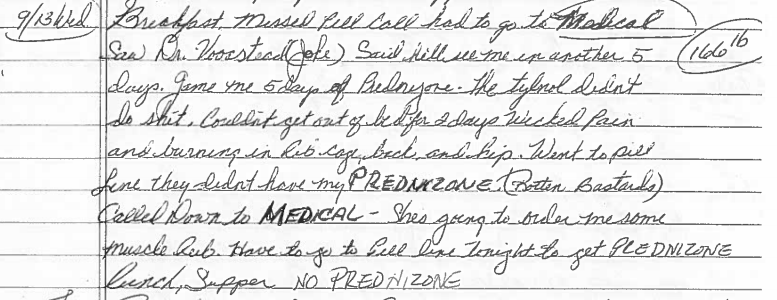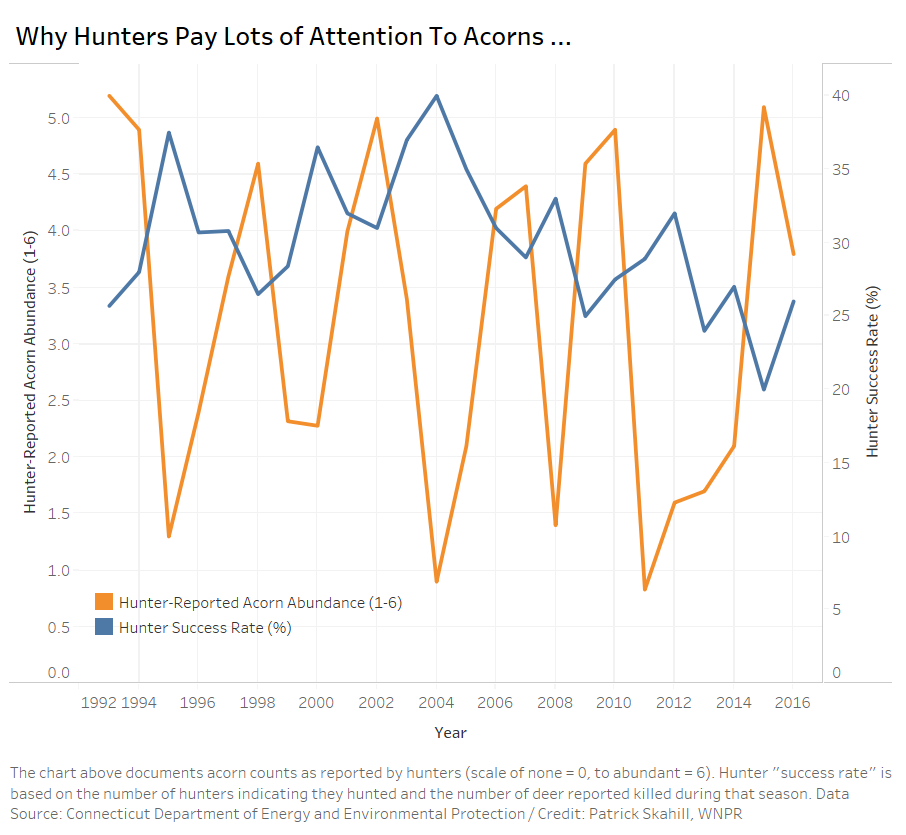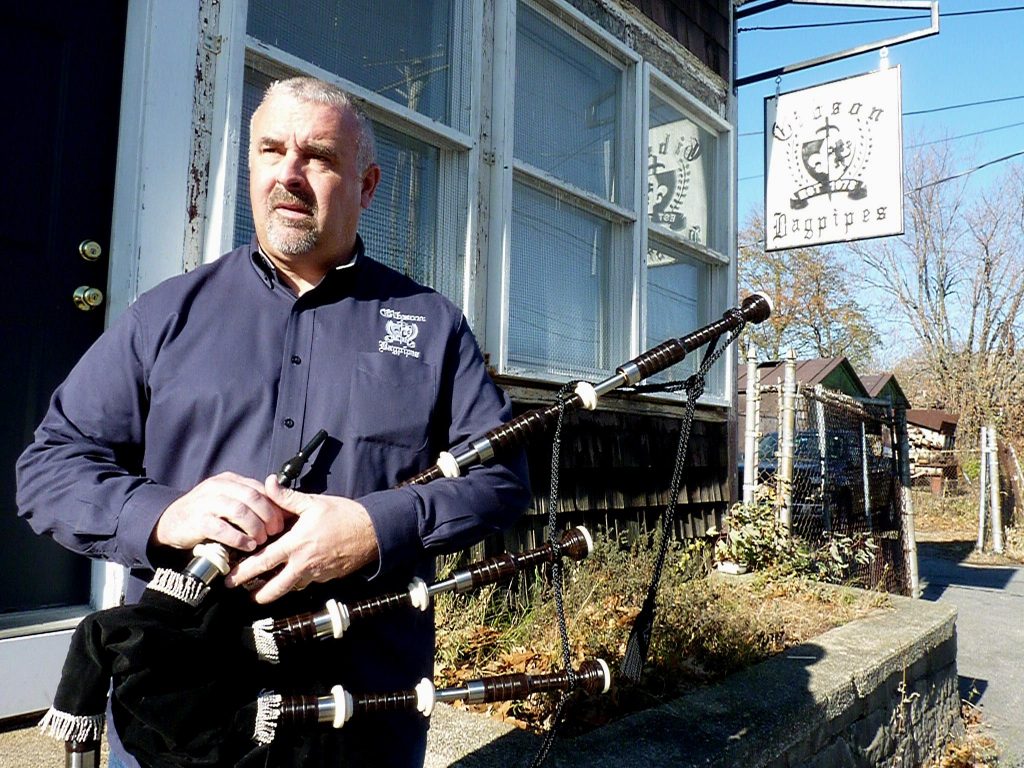Episode 74: Locked Away (Updated)

What does a state owe to people serving time in prison? And what does it owe those who should never have been locked up in the first place? We speak with a man who went to prison in Massachusetts for 32 years for a crime he didn’t commit. And we travel back over 300 years to a war on New England soil where women leaders played a major role. Plus, elm trees make a comeback, and a New Hampshire bagpipe business bumps up against global trade rules.
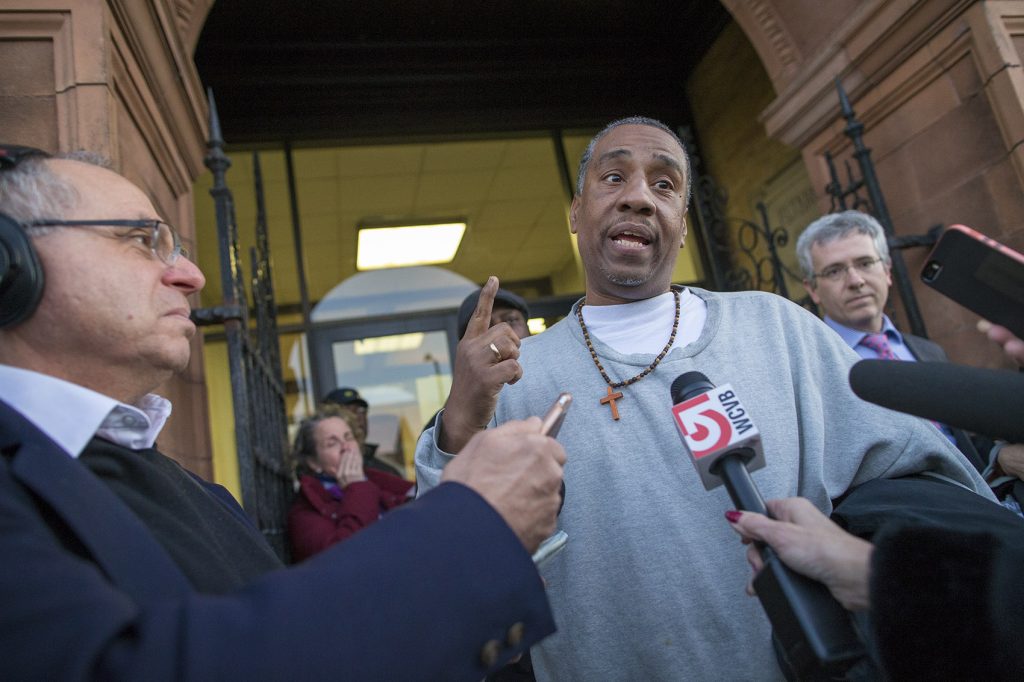
Released on bail after serving 32 years on a murder charge after doubts about his guilt surfaced, Darrell Jones speaks to the media in front of the Brockton, Mass. Superior Courthouse. Photo by Jesse Costa for WBUR
Behind Bars
On December 21, Darrell Jones walked out of a courthouse in Brockton, Massachusetts, 32 years after being convicted for a murder he always maintained he didn’t commit. Jones – who is African American – was released based on suspicions that police tampered with video evidence, and allegations of racial bias among jurors.
Standing on the courthouse steps, Jones made a plea for others like him.
“I stayed in prison a long time, not just for something I did not do,” He told reporters. “But it was hard to get people to hear you, so I’m trying to get everybody here to understand one point: There is somebody else back at that jail that nobody is listening to that’s probably innocent, and been trying to fight like I’ve been trying to fight, and I’m just asking all the reporters and all the people that do this, to sometimes just give them a chance.”
Now imagine yourself in that situation: walking out of court, your innocence finally proven. Would you expect the state to compensate you for your time behind bars?
37 states have some sort of law that allows the wrongfully convicted to file for compensation, including every New England state except Rhode Island. The dollar amount ranges widely from state to state. For example, Vermont awards exonerees between $30,000 and $60,000 for each year in prison, while New Hampshire caps the total lifetime award at $20,000.
It can be difficult to get any money at all from the state. Advocates say that’s the case in Massachusetts, where a rewrite of the wrongful convictions compensation law is moving through the legislature.
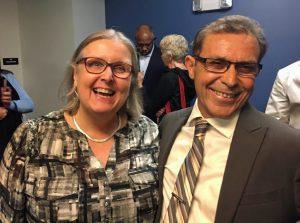
Victor Rosario, on Sept 8, with wife Beverly, following a hearing in which he was formerly exonerated. Photo by Debora Becker for WBUR
In light of the news about Darrell Jones, we’ve decided to revisit our November conversation with Jenifer McKim and Victor Rosario.
Jenifer McKim is a senior investigative reporter at the New England Center for Investigative Reporting, where she’s been covering wrongful convictions – including the Darrell Jones case – and the legislative push.
Rosario was convicted for starting a fatal apartment fire in Lowell, Massachusetts in 1982 – but his sentence was overturned in 2014. A 2010 report from the New England Center for Investigative Reporting pointed to his innocence. Rosario was formally exonerated on September 8, 2017. Ordained while in prison, he now works as an outreach pastor at the Tremont Temple Baptist Church in Boston, where runs a program to help former prisoners readjust to society.
Further reading:
“Should state change compensation law for wrongfully convicted?” – recent reporting from the NECIR and WGBH about efforts to amend the Massachusetts law governing compensation for the wrongfully convicted
“Reasonable Doubts” – NECIR investigation into the case of Darrell Jones, a Massachusetts man who has spent 32 years in prison on a questionable murder charge
“Wrongful incarceration. Moral debt?” – Jenifer McKim tells the story of Kevin O’Loughlin, a man falsley convicted for child rape, who is struggling to obtain compensation from Massachusetts
There have been rumors and allegations coming out of Vermont’s prison system for years about inmates requesting medical care, and not getting the help they needed. But getting the full story can be challenging: the inmates involved are behind bars, or dead, and officials are bound from giving their account by privacy rules.
But Roger Brown, an inmate at a prison in Camp Hill, Pennsylvania, kept a diary. Brown was one of more than 200 Vermont inmates sent to state prison in Pennsylvania due to a shortage of beds in Vermont. Taylor Dobbs reported this story for Vermont Public Radio.
Revisiting King Philip’s War
Here on NEXT, we’ve shared the stories of refugees from countries like Syria and Iraq- people who escaped war to start over in a peaceful New England. But during the early years of European colonization, New England was a war zone too – where colonists fought indigenous people over land, resources, and the rights to self-government.

Native homelands of the Northeast, highlighting places mentioned in Our Beloved Kin: A New History of King Philip’s War. Courtesy Yale University Press
King Philip’s War, fought from 1675 to 1678, was perhaps the most devastating of those conflicts for both sides. The Wampanoag leader Metacom, known by the the colonists as King Philip, organized attacks on 12 settlements before the colonists gained control of Southern New England.
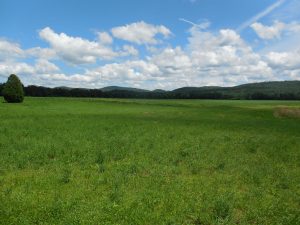
This meadow abutting the Connecticut River in Vernon, Vermont is illustrative of the fertile fields and floodplains that indigenous women used to plant crops in the 1600s. Photo courtesy Lisa Brooks.
Since then, as it often happens, the colonial perspective has dominated the historical narrative.
In her upcoming book Our Beloved Kin: A New History of King Philip’s War, historian Lisa Brooks flips the script, focusing on the stories of Native American leaders. Lisa Brooks is Associate Professor of English and American Studies at Amherst College.
Our Beloved Kin is out from Yale University Press on January 9, 2018. At the same time, Brooks will also be launching ourbelovedkin.com, a website with maps, historical documents, and images from her journeys through New England’s indigenous geography. Brooks will speak about the book at the Massachusetts Historical Society in Boston on February 7, and at Harvard on February 14.
Acorns, Elm Trees and Bagpipes
It’s nearing the end of mating season for deer in our region, and deer hunting season wrapped up a few weeks ago. This time of year, a more likely encounter with a deer would be on the road, with a bad outcome for both you and the animal. New England states rank right around the national average for likelihood of a car strike, but the danger increases in rural areas during mating season.
WNPR’s science reporter Patrick Skahill spoke with a biologist to find out more. And he uncovered an interesting connection between roadkills and acorns.

An American elm tree in 2012 at Spring Grove Cemetery in Hartford, Connecticut. Photo via Wikimedia Commons
No matter where you live in New England, you probably know of an Elm Street; but if you go there, you probably won’t find many surviving elm trees.
In the mid 20th century Dutch Elm disease killed off millions of the species. Towns and forests were notably changed. Decades later, new invasive pests and disease are attacking other species of trees. Watching this, ecologists have been engineering a comeback for the American elm, as New England Public Radio’s Jill Kaufman reports.

Newly made bagpipe parts await assembly inside Gibson’s Nashua factory. Photo by Todd Bookman for NHPR
Think bagpipes, and you likely think Scotland. But one of the world’s largest bagpipe manufacturers happens to call Nashua, New Hampshire home. That company, however, recently faced an unexpected wrinkle in its international supply chain. New Hampshire Public Radio’s Todd Bookman reports.
About NEXT
NEXT is produced at WNPR.
Host: John Dankosky
Producer: Andrea Muraskin
Executive Producer: Catie Talarski
Contributors to this episode: Taylor Dobbs, Patrick Skahill, Jill Kaufman, Todd Bookman, Bruce Gellerman
Music: Todd Merrell, “New England” by Goodnight Blue Moon, bagpipe music by Eric Bean
We appreciate your feedback! Send praise, critique, suggestions, questions, story leads, and bagpipe music recommendations to next@wnpr.org.

